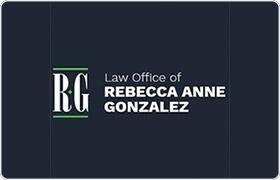 Waring Family Law Lawyers, Texas
Waring Family Law Lawyers, Texas
Sponsored Law Firm
-
 x
x

Click For More Info:
-
Law Office of Rebecca Anne Gonzalez
10101 Reunion Place Suite 615 San Antonio, TX 78216» view mapDivorce & Family Law Continuing The Gonzalez Legacy
At the Law Office of Rebecca Anne Gonzalez, my goal is to make certain you feel taken care of. My team and I work hard to protect what is important to you.
800-735-1530
Includes: Collaborative Law, Domestic Violence & Neglect, Paternity, Prenuptial Agreements
Lawyers
1-10 of 24 matches
Consumer Bankruptcy, Business & Trade, Criminal, Family Law, Wills
Personal Injury, Divorce & Family Law, Litigation, Family Law
Elder Law, Family Law, Commercial Real Estate, Clean Air Practice
Consumer Bankruptcy, Family Law, Litigation, Construction, Commercial Real Estate
Personal Injury, Criminal, Family Law, Estate Planning, Litigation
Elder Law, Criminal, Family Law, Wills, Dispute Resolution
Criminal, Divorce & Family Law, Family Law
Credit & Debt, Elder Law, Family Law, Wills, Litigation



 Rebecca Gonzalez San Antonio, TX
Rebecca Gonzalez San Antonio, TX Practice AreasExpertise
Practice AreasExpertise